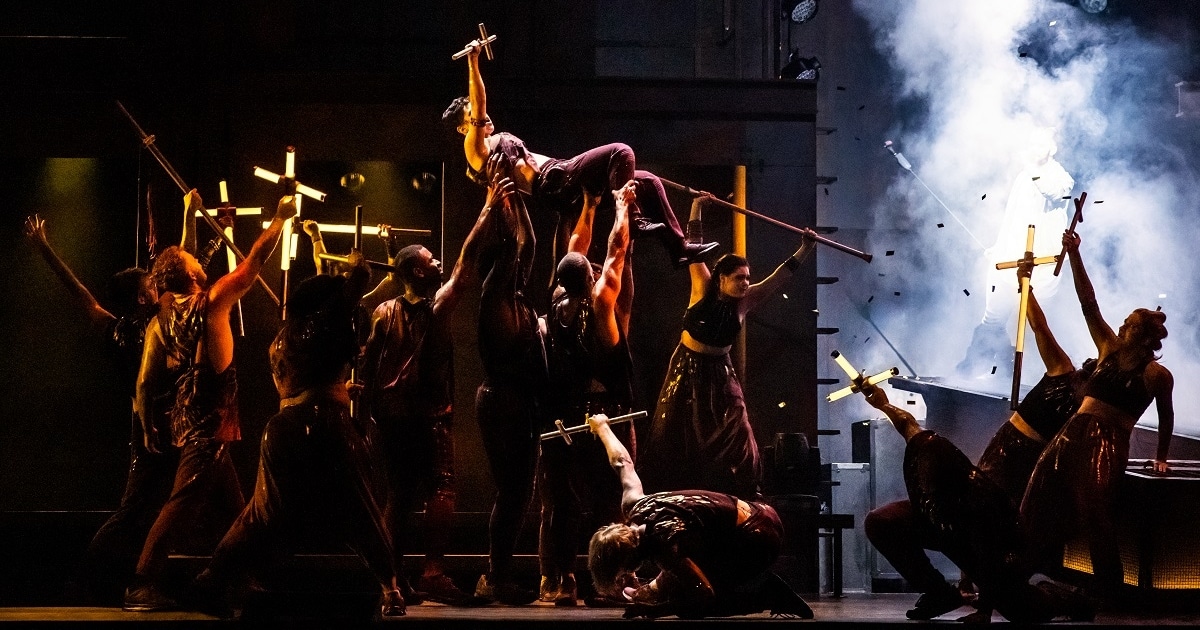DCPA NEWS CENTER
Enjoy the best stories and perspectives from the theatre world today.
Enjoy the best stories and perspectives from the theatre world today.

The North American Tour company of Jesus Christ Superstar. Photo by Evan Zimmerman for MurphyMade
From blasphemy to Broadway to banned to broadcast television, few pop-culture titles have generated the kind of buzz Jesus Christ Superstar has generated.
More than 50 years since its debut, this iconic musical phenomenon is back, buoyed by a jaw-dropping 2018 reimagination that aired as a live concert on NBC and left many critics saying the high-energy staging had set a new standard for live theatrical broadcasts.
“What could have felt like a dated rock opera was more like an uproarious arena concert filled with screaming fans,” wrote “Deadline” critic Dino-Ray Ramos.
That Emmy Award-winning effort essentially cast the live audience as the so-called 50,000 screaming Jesus fans that Simon sings are ready to “ride into Jerusalem” and effect the greatest revolution in world history. That ambience is more in line with the kind of energy composer Andrew Lloyd Webber first had in mind when he and Tim Rice dared to imagine the final weeks in the life of Jesus Christ through a decidedly late 1960s rock ’n’ roll lens.
“Superstar was written like a radio play, because that was the closest thing we had available to us,” Webber told Rolling Stone magazine. “I think it works best when it’s closer to a rock concert.”
From the start, Superstar was slammed as blasphemous. Imagine the audacity of a new rock musical that dared to tell the story of Christ’s downfall from the sympathetic perspective of his chief betrayer?
The writers couldn’t find a producer at first. “We were told it was the worst idea in history,” Lloyd Webber later recalled. So he and Rice transformed their stage musical into a two-record concept album that was released in 1970, just after The Who’s own two-record celebrity opus, “Tommy.”
But Rice was more inspired by the Bob Dylan anthem “With God On Our Side,” which features Judas in its penultimate verse. Rice was fascinated by the idea of Judas not as a craven back-stabber but rather a close friend struggling with the implications of Jesus’ growing popularity.
“From a very young age, I had wondered what I might have done in the situations in which Pontius Pilate and Judas Iscariot found themselves,” Rice wrote in his autobiography. “How were they to know Jesus would be accorded divine status by millions and that they would as a result be condemned down the ages?”
When the legendary concept album hit No. 1 on the Billboard charts behind songs such as “I Don’t Know How to Love Him,” “Gethsemane,” “Heaven on their Minds” and the title tune, a Broadway staging went from impossible to inevitable. American fans had begun staging unauthorized live performances in churches and theaters around the country.
But what bowed on Broadway in 1971 was polarizing. Webber himself called that first (of four) Broadway productions “brash and vulgar” — and he was not alone. The show was banned in South Africa and protested by everyone from the American Jewish Committee to the Anti-Defamation League of B’nai B’rith to evangelist Billy Graham. (Though Graham did acknowledge that “if the production causes young people to search their Bibles, to that extent it may be beneficial.”)
One of the major criticisms of Webber and Rice was having Judas come back from the dead to sing the title song, without taking a stand on the possible resurrection of Jesus.
But if you look closely at the final shot of the 1973 film, said Ted Neeley, who played Jesus in the film (and on stage for the next 40 years), you can see a mysterious someone walking in the desert. “And let me just say: Those who have eyes to see will see that mysterious someone,” Neeley told The Denver Post during a 2008 tour stop in Denver.
“The reason for that shot is that Norman Jewison and myself took issue with the fact that Tim and Andrew felt the piece needed to end with a crucifixion, showing no suggestion of possible resurrection and ascension,” Neeley said. “So when Norman made the film, that mysterious appearance is to suggest that life does go on, that there was resurrection of the spirit.”
Ironically, Jesus Christ Superstar has found favor with Catholic popes across the decades. Jewison, who directed the 1973 film, arranged a special screening for Pope Paul VI. Neeley quotes Paul VI as saying: “Mr. Jewison, not only do I appreciate your beautiful rock-opera film, I believe it will bring more people around the world to Christianity than anything ever has before.”
From its birth, Superstar reflected the rock roots that defined a generation. It has been credited (and blamed) for ushering in Broadway’s decades-long “British invasion” that brought such mega-hits as Cats and Les Misérables. And as time has passed, it has proven to be one of those musicals that demands to be re-interpreted again and again.
DETAILS
Jesus Christ Superstar
Jan 23-28, 2023 • Buell Theatre
Tickets
